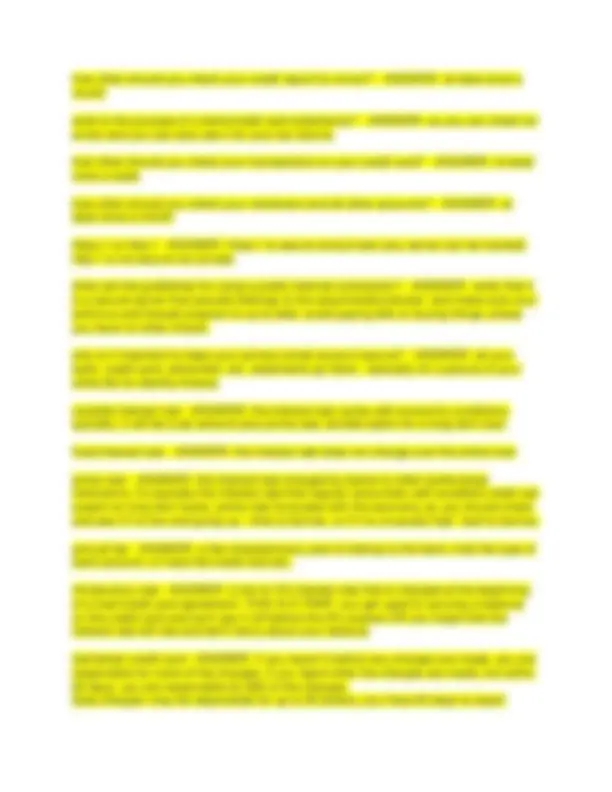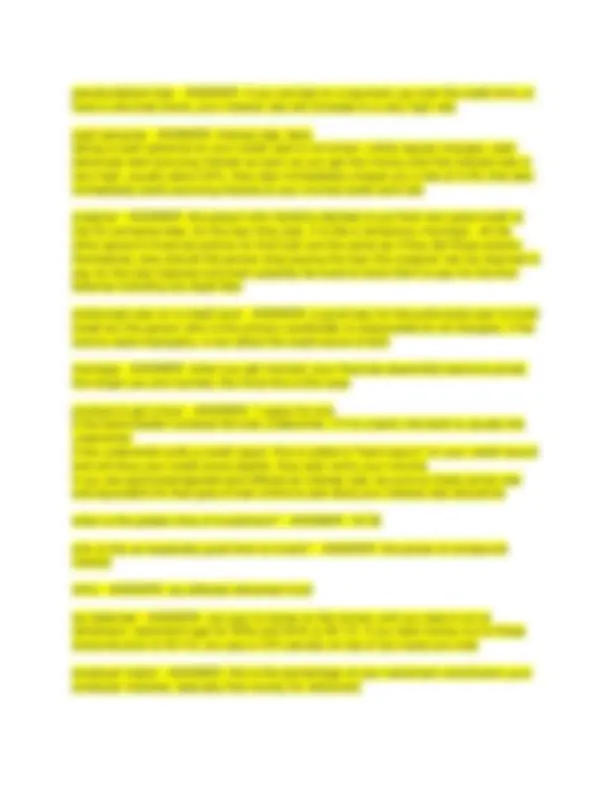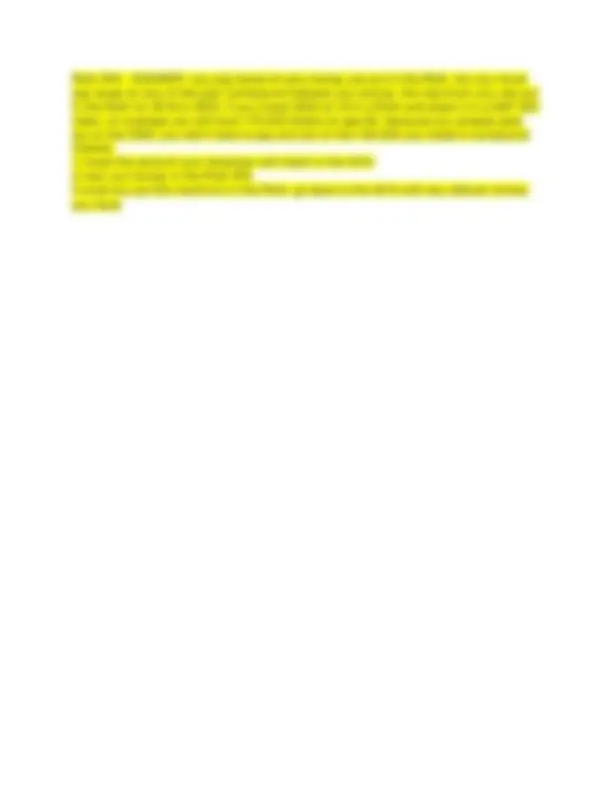





Study with the several resources on Docsity

Earn points by helping other students or get them with a premium plan


Prepare for your exams
Study with the several resources on Docsity

Earn points to download
Earn points by helping other students or get them with a premium plan
Community
Ask the community for help and clear up your study doubts
Discover the best universities in your country according to Docsity users
Free resources
Download our free guides on studying techniques, anxiety management strategies, and thesis advice from Docsity tutors
H&R Block Challenge Test Questions With Correct Detailed Answers 2025.pdf
Typology: Exams
1 / 6

This page cannot be seen from the preview
Don't miss anything!




interest rate - ANSWER- the amount you pay or earn for borrowing or loaning money compound interest - ANSWER- interest on interest, basically interest plus time equals interest on your interest which equals increasing amounts of money NSF fee - ANSWER- charged by the bank because you do not have enough money to cover the check/charge returned check fee - ANSWER- charged by the person/company you wrote the check/made the debit card charge because you did not have sufficient funds to cover the check/charge overdraft protection - ANSWER- feature you can get on a bank checking count that links your checking account to your credit card/savings account. if you have check/charge bounce, the bank will charge you a small fee and use your credit card/savings account to cover the check/charge credit utilization - ANSWER- the percentage of your credit you are using credit utilization percent - ANSWER- the total amount you owe divided by the total amount of your credit which two factors determine 70% of your credit rating? - ANSWER- credit card utilization % and your payment history what is a credit report? - ANSWER- how much you owe and how much credit you have. 7 year history of your payments and any loans you have as well as any unpaid taxes you have been sued for (tax lien) and now have your wages taken right out of your check which is bankruptcy who is responsible for checking the accuracy of your credit report? - ANSWER- you how long does negative information remain on your credit record? - ANSWER- 7 years what sort of jobs will possibly not hire you if you have a poor credit rating? why? - ANSWER- financial industry because they fear you will steal or commit fraud. government and law enforcement because they fear you will sell secrets and take bribes
how does your credit score affect your costs and interest rate for borrowing? - ANSWER- just like with scales, the higher your credit the lower your costs, the lower your credit, the higher your costs. they work together in tandem. what is the best way to build your credit? - ANSWER- get a credit card at 18, charge 19%-30% of your credit limit per month, pay it all off every month on time. inflation - ANSWER- an increase in the price of good or services. it is the tendency in a healthy economy for good and services to gradually increase in price over time mutal fund - ANSWER- a portfolio (basket/group) of stocks managed (bought, sold and held) by a real live person or a team of people. higher fees and expenses index fund - ANSWER- a portfolio of stocks typically managed by a computer program. it buys a particular kind of stock or a slice of the whole stock market. very low fees. this is your best choice for retirement when you are young because it is easy, cheap, and performs very well. bonds - ANSWER- a relatively safe and cheap investment but it does not grow your money very well. good choice after you retire. a tiny piece of government debt - a city, state, or the federal government will borrow money to build something stocks - ANSWER- tiny piece of a company dividend - ANSWER- you portion of the proft the company made that year. older larger companies are the ones that pay dividends potential consequential for not having car insurance - ANSWER- car insurance: you'll pay for the repair of your car, any injuries you sustain. if it's your fault, you will pay for the injuries of your passengers and all the people in the other car,a as well as repairs to the other car. if the police are called, you'll be ticketed, your car may be impounded, and you may be arrested. you can be sued for any damages you can't pay and the judges may garnish your wages until the money is paid off. also, your car insurance increases dramatically if you allow it to lapse just pulled over by the police: get a ticket, car may be impounded, and you may be arrested. car insurance will increase dramatically decuctibile - ANSWER- the money that is your responsibility to pay if you must make an insurance claim. liability vs full coverage - ANSWER- liability: only covers the other cars and people (required by law) full coverage: covers your car, and your passengers, and the other cars and people
penalty/default rate - ANSWER- if you are late on a payment, go over the credit limit, or have a returned check, your interest rate will increase to a very high rate cash advance - ANSWER- interest rate, fees. taking a cash advance on your credit card is not smart. unlike regular charges, cash advances start accruing interest as soon as you get the money and that interest rate is very high, usually about 24%. they also immediately charge you a fee of 3-5% that also immediately starts accruing interest at your normal credit card rate cosigner - ANSWER- the person who foolishly decides to put their own good credit at risk for someone else. for the loan they sign, it is like a temporary marriage - all the other person's financial actions for that loan are the same as if they did those actions themselves. also should the person stop paying the loan the cosigner can be required to pay for the loan balance and even possibly be sued to force them to pay for the loan balance including any legal fees authorized user on a credit card - ANSWER- a good way for the authorized user to build credit but the person who is the primary cardholder is responsible for all chargers. if the card is used improperly, it can affect the credit score of both marriage - ANSWER- when you get married, your finances essentially become joined, the longer you are married, the more this is the case process to get a loan - ANSWER- 1 apply for one 2 the bank/retailer contacts the loan underwriter. if it is a bank, the bank is usually the underwriter 3 the underwriter pulls a credit report. this is called a "hard inquiry" on your credit record and will drop your credit score slightly. they also verify your income 4 you are approved/rejected and offered an interest rate. be sure to check prime rate and equivalent for that type of loan online to see what your interest rate should be when is the golden time of investment? - ANSWER- 18 - 35 why is this an especially good time to invest? - ANSWER- the power of compound interest 401k - ANSWER- tax differed retirement fund tax deferred - ANSWER- you pay no taxes on the money until you take it out at retirement. retirement age for IRAs and 401k is 59 1/2. if you take money out of these accounts prior to 59 1/2, you pay a 10% penalty on top of any taxes you owe employer match - ANSWER- this is the percentage of your retirement contribution your employer matches, basically free money for retirement
Roth IRA - ANSWER- you pay taxes on any money you put in the Roth, but you never pay taxes on any of the gain (compound interest) you accrue. the maximum you can put in the Roth for 2018 is 5500. if you invest 5500 at 18 in a Roth and place it in a S&P 500 index, on average you will have 170,000 dollars at age 60. because you already paid tax on the 5500, you don't have to pay any tax on the 164,500 you made in compound interest. 1 invest the amount your employer will match in the 401k 2 next, put money in the Roth IRA 3 once you put the maximum in the Roth, go back to the 401k with any leftover money you have